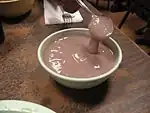poi
See also: POI and P.O.I.
English
Pronunciation
- (UK, General American) IPA(key): /pɔɪ/
Audio (Southern England) (file) - Rhymes: -ɔɪ
Etymology 1

A bowl of poi.
Borrowed from Hawaiian poi.
Noun
poi (uncountable)
- (Hawaii) The traditional staple food of Hawaii, made by baking and pounding the kalo (or taro) root, and reducing it to a thin paste, which is allowed to ferment. [from 18th c.]
- 2012, Julia Flynn Siler, Lost Kingdom, Grove Press, page 104:
- It was a far cry from the traditional Hawaiian feast, which always included the beloved poi, a purplish paste made from pounded taro root […] .
-
- A creamy Samoan dessert of ripe bananas mashed with coconut cream.
Etymology 2

Fire poi (juggling).
Borrowed from Maori poi.
Noun
poi (plural poi or pois)
- (New Zealand) A small ball made of leaves and fibres, attached to a string. [from 19th c.]
- 2008, Ellen Koskoff, “Haka poi”, in The Concise Garland Encyclopedia of World Music, Routledge, →ISBN, page 738:
- Warriors formerly used poi actions to maintain wrist flexibility, but poi have developed as a women's dance. Classic poi dances and songs are reputed to have been those of the people of the Taranaki, Rotorua, and Whanganui tribal areas, but poi are now performed everywhere in Aotearoa.
- 2013, Catriona Rainsford, The Urban Circus: Travels with Mexico's Malabaristas, Bradt Travel Guides, →ISBN, page 18:
- A couple of days later Trico announced that, if I were to travel with them, it was imperative that I learn some form of malabares, or circus skill. The available options were poi, staff or juggling. ‘Poi’, the form of malabares that Sandra played, are two balls at the end of chains which are spun in patterns around the body. When the balls are replaced by wicks soaked in gasoline and set alight, the poi ‘spin fire’.
-
- (New Zealand) A traditional dance performed by Maori women involving the rhythmic swinging of such a ball. [from 19th c.]
Further reading
 poi (food) on Wikipedia.Wikipedia
poi (food) on Wikipedia.Wikipedia  poi (performance art) on Wikipedia.Wikipedia
poi (performance art) on Wikipedia.Wikipedia
Anagrams
- IOP, IPO, OPI, PIO, Pio
Guaraní
Verb
poi
- to quit (doing something)
- to let go, to unleash
Conjugation
Conjugation of poi
| singular | plural | |||||||
|---|---|---|---|---|---|---|---|---|
| 1st person | 2nd person | 3rd person | 1st person inclusive | 1st person exclusive | 2nd person | 3rd person | ||
| active | ||||||||
| indicative | che apoi | nde repoi | ha'e opoi | ñande japoi | ore ropoi | peẽ pepoi | ha'ekuéra opoi/opoi hikuái | |
| hortative | tapoi che | terepoi nde | topoi ha'e | tajapoi ñande | taropoi ore | tapepoi peẽ | topoi ha'ekuéra/hikuái | |
| imperative | - | epoi | - | - | - | pepoi | - | |
| passive | ||||||||
| indicative | che ajepoi | nde rejepoi | ha'e ojepoi | ñande jajepoi | ore rojepoi | peẽ pejepoi | ha'ekuéra ojepoi/ojepoi hikuái | |
| hortative | tajepoi che | terejepoi nde | tojepoi ha'e | tajajepoi ñande | tarojepoi ore | tapejepoi peẽ | tojepoi ha'ekuéra/hikuái | |
| imperative | - | ejepoi | - | - | - | pejepoi | - | |
| reciprocal | ||||||||
| indicative | - | - | - | ñande jajopoi | ore rojopoi | peẽ pejopoi | ha'ekuéra ojopoi/ojopoi hikuái | |
| hortative | - | - | - | tajajopoi ñande | tarojopoi ore | tapejopoi peẽ | tojopoi ha'ekuéra/hikuái | |
| imperative | - | - | - | - | - | pejopoi | - | |
| coactive | ||||||||
| indicative | che ambopoi | nde rembopoi | ha'e ombopoi | ñande ñambopoi | ore rombopoi | peẽ pembopoi | ha'ekuéra ombopoi/ombopoi hikuái | |
| hortative | tambopoi che | terembopoi nde | tombopoi ha'e | tañambopoi ñande | tarombopoi ore | tapembopoi peẽ | tombopoi ha'ekuéra/hikuái | |
| imperative | - | embopoi | - | - | - | pembopoi | - | |
| objective | ||||||||
| indicative | che aropoi/agueropoi | nde reropoi/regueropoi | ha'e oropoi/ogueropoi | ñande jaropoi/jagueropoi | ore roropoi/rogueropoi | peẽ peropoi/pegueropoi | ha'ekuéra oropoi/ogueropoi//oropoi/ogueropoi hikuái | |
| hortative | taropoi/tagueropoi che | tereropoi/teregueropoi nde | toropoi/togueropoi ha'e | tajaropoi/tajagueropoi ñande | taroropoi/tarogueropoi ore | taperopoi/tapegueropoi peẽ | toropoi/togueropoi ha'ekuéra/hikuái | |
| imperative | - | eropoi/egueropoi | - | - | - | peropoi/pegueropoi | - | |
| subsuntive¹ | ||||||||
| indicative | che aporopoi/amba'epoi | nde reporopoi/remba'epoi | ha'e oporopoi/omba'epoi | ñande japoropoi/ñamba'epoi | ore roporopoi/romba'epoi | peẽ peporopoi/pemba'epoi | ha'ekuéra oporopoi/omba'epoi//oporopoi/omba'epoi hikuái | |
| hortative | taporopoi/tamba'epoi che | tereporopoi/teremba'epoi nde | toporopoi/tomba'epoi ha'e | tajaporopoi/tañamba'epoi ñande | taroporopoi/taromba'epoi ore | tapeporopoi/tapemba'epoi peẽ | toporopoi/tomba'epoi ha'ekuéra/hikuái | |
| imperative | - | eporopoi/emba'epoi | - | - | - | peporopoi/pemba'epoi | - | |
| ¹: the subsuntive forms with -poro- are used with humans, while the forms with -mba'e- are used with animals. | ||||||||
Hawaiian
Noun
poi
- Traditional staple food of Hawaiʻi. A porridge-like substance made from cooked and ground taro corm mixed with water.
Italian
Etymology
From Vulgar Latin *pos, from Classical Latin post.[1] Compare Portuguese pois, Spanish pues, French puis, and Romanian apoi (archaic păi).
Pronunciation
- IPA(key): /ˈpɔj/
Audio (file) - Rhymes: -ɔj
- Hyphenation: pòi
Adverb
poi
- then
- later
Derived terms
- poiché
Related terms
- dopo
Noun
il poi m (invariable)
- the future
References
- “poi” in: Alberto Nocentini, Alessandro Parenti, “l'Etimologico — Vocabolario della lingua italiana”, Le Monnier, 2010, →ISBN
Anagrams
- Pio, ipo-, pio, pio-
Japanese
Romanization
poi
- Rōmaji transcription of ぽい
- Rōmaji transcription of ポイ
Jingpho
Etymology
Borrowed from Burmese ပွဲ (pwai:).
Noun
poi
- feast, festival
References
- Kurabe, Keita (2016-12-31), “Phonology of Burmese loanwords in Jinghpaw”, in Kyoto University Linguistic Research, volume 35, DOI:, ISSN 1349-7804, pages 91–128
Old French
Etymology
From Latin paucus.
Adjective
poi m or f (invariable)
- few; little
Adverb
poi
- little; not much
Pronoun
poi
- few; not many (people, objects etc.)
Descendants
- French: peu
Polish
Pronunciation
- IPA(key): /ˈpɔ.i/
- Rhymes: -ɔi
- Syllabification: po‧i
Verb
poi
- third-person singular present of poić
Romanian
Adverb
poi
- Alternative form of apoi
Samoan
Noun
poi
- Samoan poi
Sukurum
Noun
poi
- water
References
- Susanne Holzknecht, The Markham languages of Papua New Guinea (1989), page 71